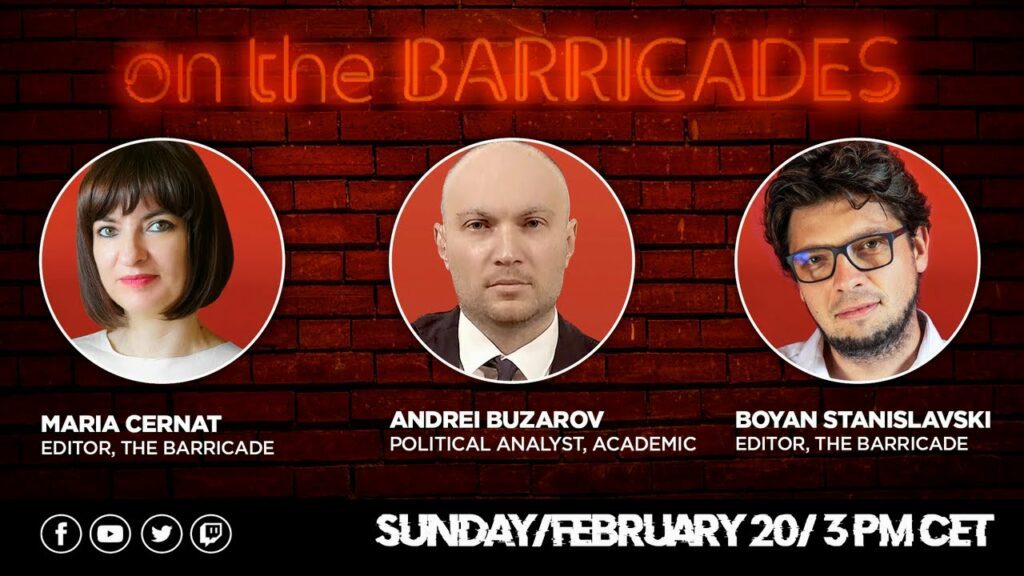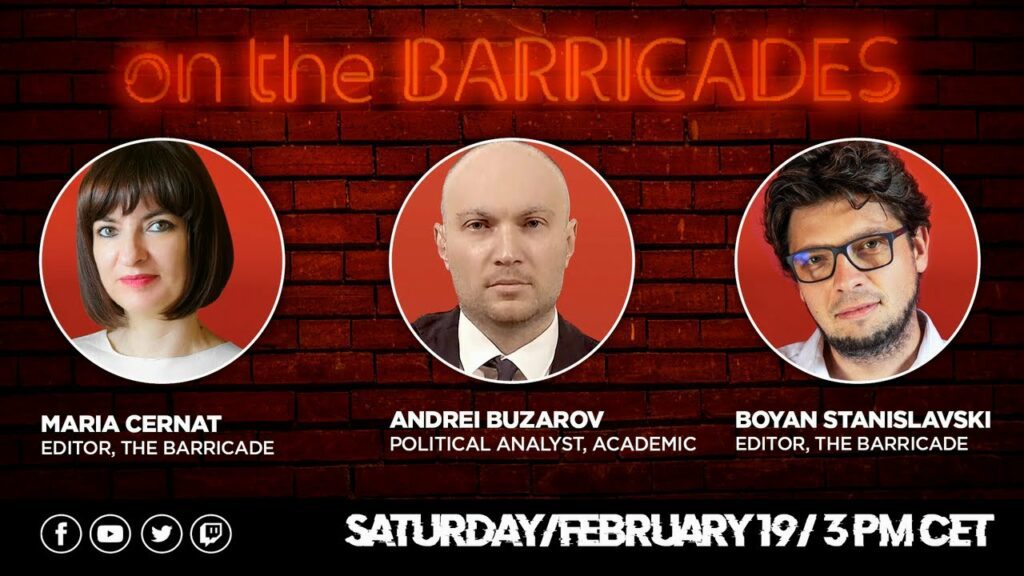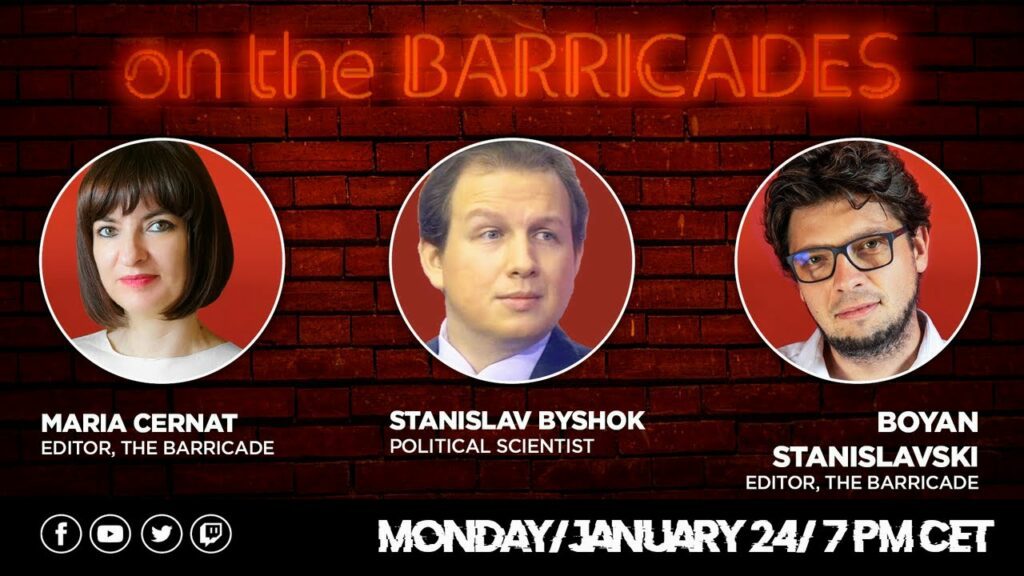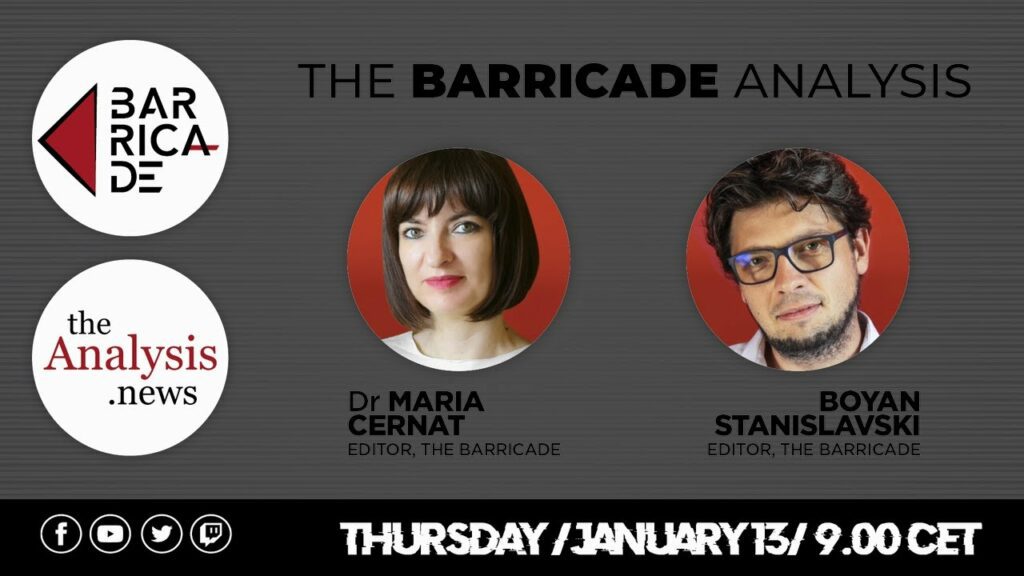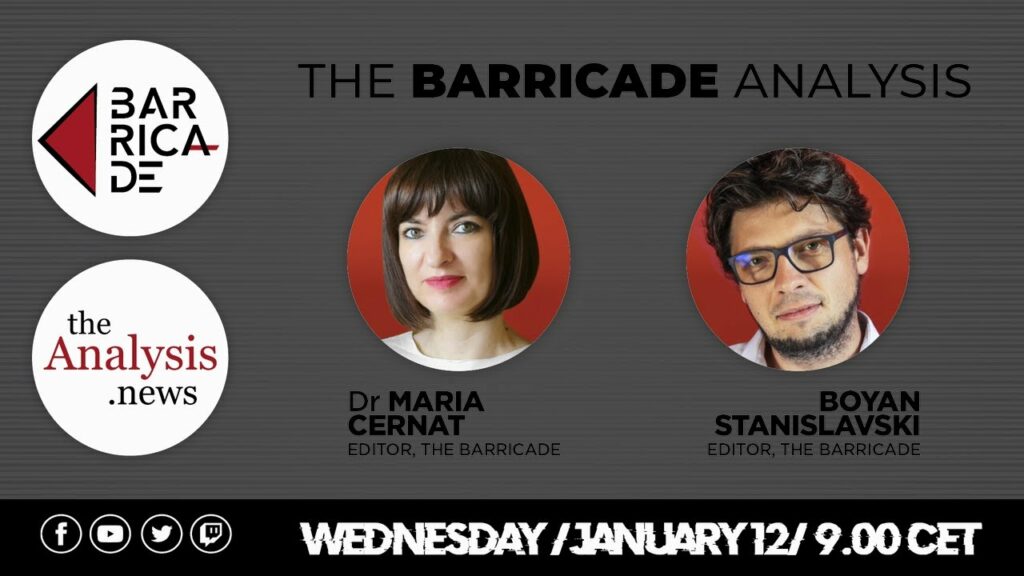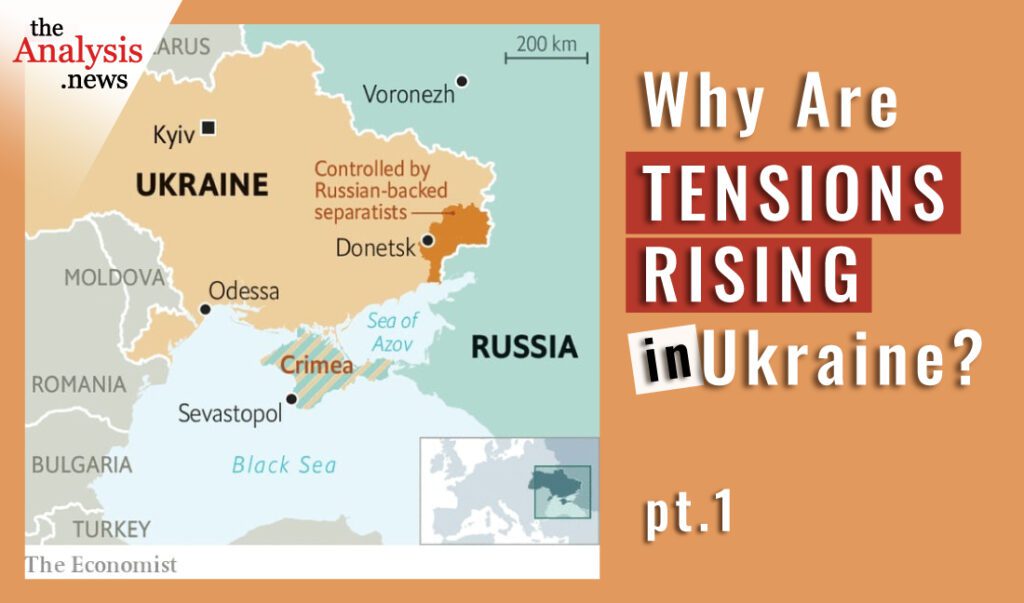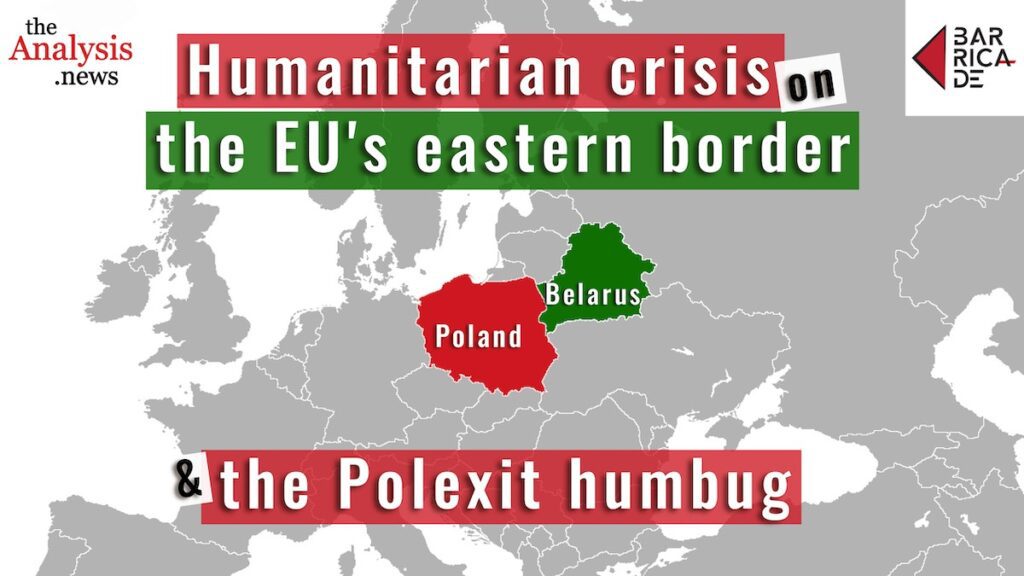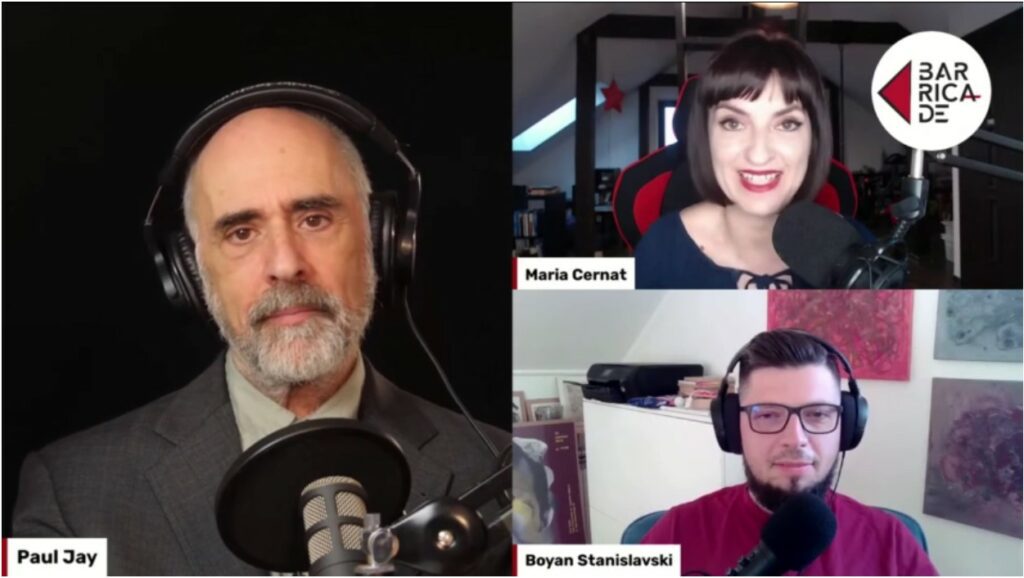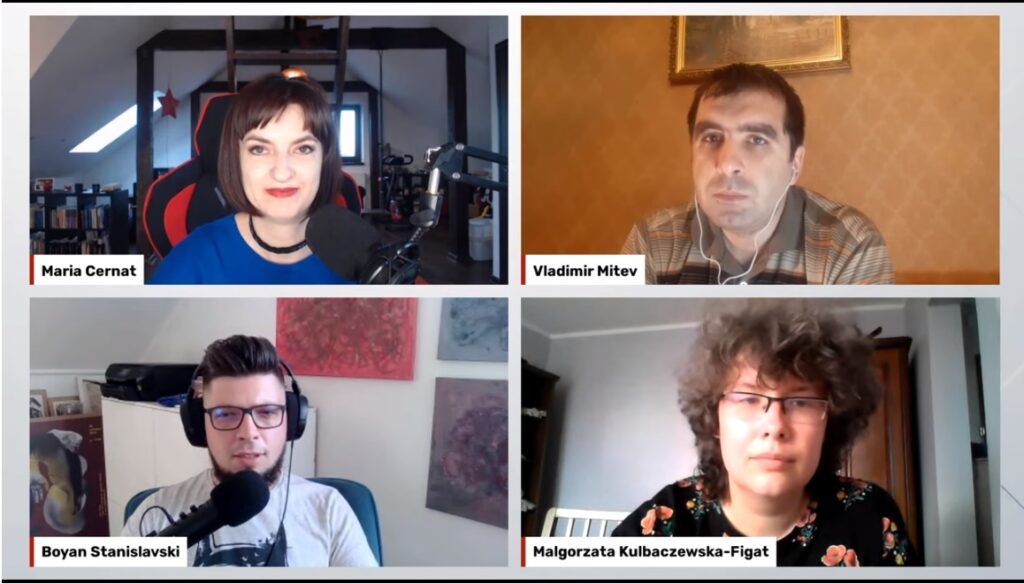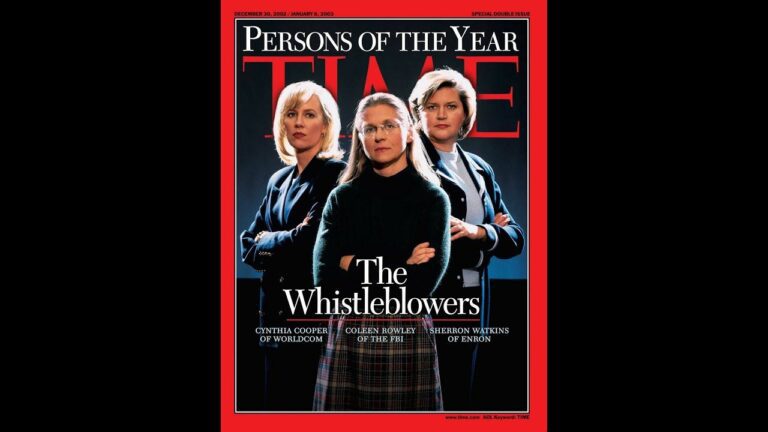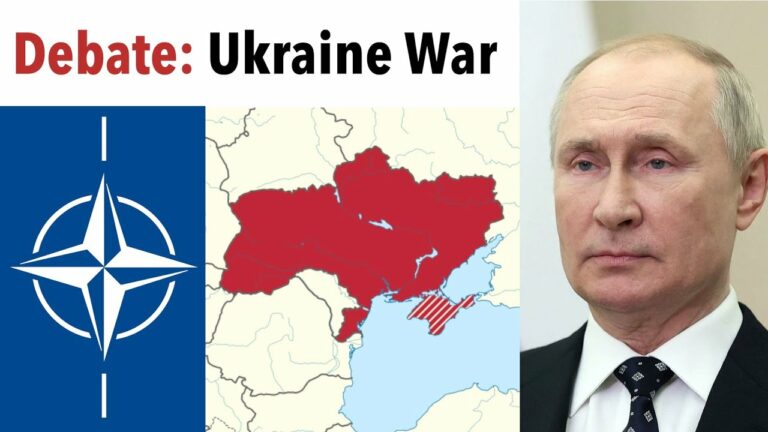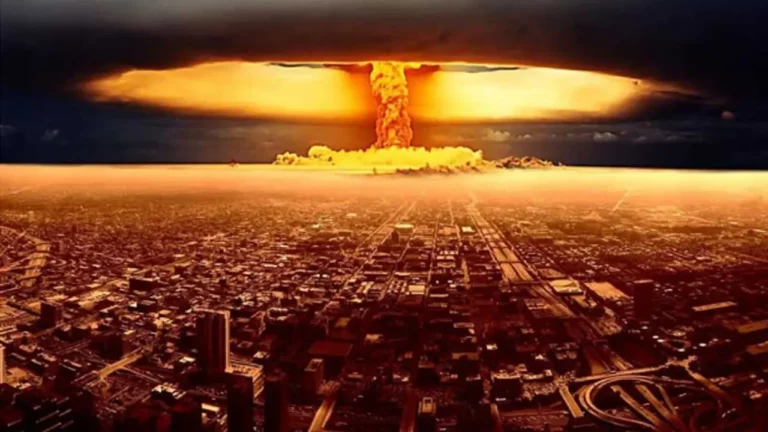The panel discusses how the oligarchs on all sides of the confrontation use nationalism to push their agendas. Does Eastern Europe consider Russia a threat? Boyan Stanislavski and Maria Cernat join Paul Jay for a collaboration on theAnalysis.news and the Barricade.
TRANSCRIPT
Paul Jay
Okay, welcome back. This is part two of my conversation about Ukraine, Russia, and the tensions there. As I say this in part one, this is a collaboration between theAnalysis.news and On The Barricades. And for analysis viewers, On The Barricades is a news and analysis bureau or website, a group that specially focuses on Eastern Europe, but they also have lots of information and understanding of Russia and what’s going on in the geopolitics of the world.
So once again, joining me is Maria Cernat. She’s a graduate of the Faculty of Journalism and Communication Studies at the Faculty of Philosophy at the University of Bucharest in Romania. And she also teaches there.
And also joining me again is Boyan Stanislavski. He’s a Polish and Bulgarian activist and a journalist, and he’s also one of the main contributors to The Barricade. Thank you both for joining me.
Maria Cernat
Thank you.
Boyan Stanislavski
Thank you. A Pleasure to be here.
Paul Jay
All right, so first of all, if you haven’t watched part one, you should because it will create the context for this because we’re going to kind of pick up the conversation more or less from where we left off.
But let me go back to a question I asked before, which is two things. One is what sparked this now? This has been going on since 2014. Tensions fight over this region, Donbas, which is majority Russian. Apparently, a lot of the people that live there do want to be part of Russia.
Now, you mentioned something in part one. In fact, Russian-speaking and Ukrainian-speaking peoples lived in Ukraine for all the time in the Soviet Union. And I know it was a repressive state and all that, but that being said, people got along. And they got along before there was a Soviet Union.
So usually, when you get these nationalist conflicts, behind them are the oligarchs, the ruling elites of these different places. And usually, there’s money to be made out of this kind of strife, whether it’s in terms of war materials or other ways. So you’ve got that. And then specifically why now, what’s triggering it?
Boyan Stanislavski
Okay, look, in terms of class analysis, as I said, well, it would be a long story, probably to explain it now how it began and how in the beginning of the ’90s and how it’s playing itself out right now. But for the sake of the conversation, let’s just point out one important thing here: the question of Ukrainian nationalism is vital to the self-orientation, self-definition, self-assertion for the Ukrainian ruling class.
I mean, in order to be the Ukrainian ruling class, you had to make it all up. It’s like there are many examples of that in Eastern Europe. And not least in Macedonia, for example, Northern Macedonia. Now it’s called Northern Macedonia. But the Ukrainian ruling class, without Ukrainian nationalism and without its Russophobic element, it would have had no reason to really exist. That’s very problematic today.
Paul Jay
And let me add the same thing is more or less true in Russia because, without Russian nationalism, people would see through what the Russian oligarchs are doing in Russia. And Russian nationalism helps cover that up. So you’ve got somewhat similar things going on on both sides.
Boyan Stanislavski
Yeah, well, but I just want to say that the difference here is that Russia is a state with very long traditions. It used to be an empire, then it used to be a Soviet Union and so on and so forth. So the Russian state is something —
Paul Jay
Okay. Well, let me add to that. It’s true in the United States, without Americanism, without Americanism, and that kind of nationalism, ‘Make America Great Again’ whether it’s coming from the Republicans or the Democrats, it plays the same role to cover up what the American oligarchy is doing.
Boyan Stanislavski
I agree with you that nationalism is often used to just cover-up, like lack of political progress and lack of social progress and so on and so forth. Yeah, I agree with that. I just want to say that in my opinion, the quality of Russian nationalism and quality of Ukrainian nationalism is different. But having said that, I just want to go to the main point here, which is the oligarchs in Ukraine for them; this ideology is extremely important. This is something that allows them to define themselves as the ruling class of a country that is very difficult to manage.
And it really is. You can see it now, particularly when there are Western or some kind of interests, powerful interest, global powerful interests involved. Then the situation becomes very volatile immediately, and we’re at the brink of war.
Now, why now has this all happened? I would say that this is a continuation of what began in April when I explained in the previous segment that there was this threat from the side of Ukraine that they’re going to invade the two breakaway republics. They called it, of course, the restoration of the territorial unity and so on and so forth. And then Russia was really amassing at that time. They were really amassing troops at the border. That was then a fact. And they were even boasting about it because they wanted to deter Ukraine from doing anything because, at the time, Ukraine was actually aiming to provoke Russia so that Russia does something that is remotely close to war. I don’t know, fire a few bullets, I don’t know, kill someone or something. And then they were hoping that they would put the Nord Stream 2 project to a halt that Maria referred to earlier.
It’s a pipeline that is going through underneath the Baltic Sea, and basically, it doesn’t go through Poland. It doesn’t go through Ukraine. It doesn’t go through any countries that are hostile to Russia today. And, yeah, it does play a role. Like I would say that at the bottom of the crisis today, yeah, Nord Stream is definitely there. But I would say—
Paul Jay
Let me add to that. In the Western press, apparently, one of [Joe] Biden’s threats to [Vladimir] Putin is if there is any military conflict, he wants Germany to cancel that Nord Stream 2.
Boyan Stanislavski
Oh, he wanted that to happen.
Paul Jay
Yeah, they’ve been wanting that anyway, but they particularly wanted [inaudible 00:06:59].
Boyan Stanislavski
And they were not getting anywhere with this demand. And this is one of the things that I think Joe Biden and his administration was extremely irritated about. And Angela Merkel, the Chancellor—well, now she’s not the Chancellor anymore, but she used to be until a couple of days ago. The Chancellor of Germany, Angela Merkel, was very strict about it. That no, we are going through with Nord Stream 2. And I don’t quite understand why would anyone in America expect any different answer? I mean, maybe the American ruling class is just accustomed to the fact that no one refuses anything when they want something.
But in fact, people like to present, including the American media and the Western European media, like to present the Nord Stream 2 initiative as some kind of Russian nefarious activity trying to undermine the gas security of Europe, and so on so forth.
Whereas it’s totally not the case. It was the German initiative like the Germans wanted that, not the Russians. And then the Russians agreed to it. And I would say even though they would not have agreed had they known what kind of problems this is going to really bring them. But that’s again, another show.
Now to the current crisis. So I would say that the objectives of the people concocting this story are three, basically. The first is that they want permission to ship large amounts of arms to Ukraine. And this is what you Paul referred to earlier, like NATO [The North Atlantic Treaty Organization], expansion treaties, and stuff like that. I totally agree with this. And as a result of this need, this demand, this desire, they want the tension to build in order for the delivery to be approved politically and so on.
The weapons in question appear to be, and I would say, those that have been supplied to the former Afghan Army. And it’s a speculation here, but I feel that perhaps they were not able to deliver all they had planned to the Afghan Army. So now they have to put it somewhere, sell it somewhere. So humvees helicopters, missiles, javelin missiles and that kind of weapons, but we’re talking about very considerable shipments. So hundreds of millions of dollars in arms, perhaps even a billion dollars, I don’t know. But something in that range, okay. Although I have to stress that here, whatever they sell, whatever they give, even to the Ukrainian Army, it will be insufficient to shift the military balance.
That’s, I guess, very important, also, perhaps for our viewers to know that in terms of military force, the Ukrainian Army is nothing even remotely comparable to the Russian Army today, no matter how many javelin missiles they’re going to buy from the Americans. Nonetheless, this is one of the reasons, in my opinion.
The second reason is that I believe they are becoming increasingly concerned, and Maria pointed it out, about Ukraine’s political situation because the economy is devastated totally. It has always been in very bad shape and deteriorating since the beginning of the ’90s. But with the pandemic now, it’s like in ruins. And speculation is growing that this President [Volodymyr] Zelensky, his job, like his position, could be jeopardized and the oligarchs, because that’s true. I mean, Ukraine is run by some kind of consulate of oligarchs, really.
There was this meeting of Ukrainian, or I think it’s still ongoing. Ukrainian oligarchs in Vilnius, the capital of Lithuania, a country north of Ukraine at the Baltic Sea close to the Polish border. And they are reportedly planning to actually depose him. And there has been much speculation about this in the Russian media and in the Ukrainian and Belarusian media.
So, yeah, that’s definitely the second reason for that crisis to occur now. And as I said in the beginning, there is concern about Nord Stream 2, given that it is expected to be certified in the spring and that the Russians are absolutely refusing to consider extending gas transit through Ukraine beyond 2024 or 2025.
So, as a result, I believe that the hardliners believe now is the time to make one final push to prevent Nord Stream 2 from receiving certification and to bolster support for them for the west in Ukraine, including Zelensky’s own support, maybe as well as, of course, Western European or European, Paneuropean support for Ukraine.
Paul Jay
I think the underlying issue here is you’ve got oligarchs in all the countries involved. And I first and foremost include the Americans, and they all want to get what they can out of the value created out of the Ukrainian people’s hard work. And the same thing goes for Russia and the United States. Okay, let’s just move to some other piece of this.
So in the West, Russia is seen as this, and I have to say this is the underlying narrative of the entire American military-industrial complex. Which is after the defeat of [Adolf] Hitler, Russia was the next Hitler. And Russia was going to be just like Hitler and want to expand, invade, occupy Western Europe and the whole world if they could.
Now we know that was a crock. That the Soviet Union never planned to do that. It was in a defensive posture. Yeah, there was an ideological battle going on. Yeah, the Soviet Union supported national liberation movements. Yeah, the Soviet Union was very repressive internally, domestically. But that being said, the Soviet Union was in no position and had no desire to become the next Hitler and try to occupy everybody.
Now Putin’s supposed to want that. And the only thing that holds Russia back from doing that is supposed to be NATO. Now China’s, the next one. China is supposed to be the next Hitler on the scene. China wants to invade Asia. Now, China; the only thing holding back China from invading Australia is America. I mean, it’s nuts, but it is the narrative.
That being said, what is the narrative in Eastern Europe? Do people see Russia as this imminent threat, that they need America and NATO to hold it back? Like, for example, Maria, how is Romania seeing what’s going on now in the Ukraine?
Maria Cernat
Well, the Romanians were always very obedient, and they took everything that the Western media told them and amplified it. I conducted research in the summer where there were human interest stories in mainstream U.S. media regarding the Afghan people wanting to depart from Kabul. Now I compared it to the titles and how that was reflected in Romanian media. That was ten times more emotional, ten times pushing on the pedal of emotions and actually amplifying those messages about how desperate the poor Afghans now are since the Liberation Army of the United States left them in the claws of these monsters that are the Taliban.
I mean, you should have seen the titles. How bombastic they were, how emotional. So basically, in Romania, we had one of the most powerful pro-NATO campaigns, I think in all Eastern Europe, and we were the ones to be the more prone to accept everything. It’s like the pro-U.S. church here.
And, of course, there is a lot of polarization because those who oppose that are polarized. And you can hardly find; I don’t think there are plenty of intellectuals in Romania. I’m saying this is an optimistic evaluation that could have a very nuanced and balanced perspective on what’s going on.
And to see beyond these very emotional discourses that the Russians are bad. They destroyed us during the communism because they invaded us. They brought communism. They brought all the ills in the world in Romania, and they are the evil monsters that only the United States can save us from.
And this is done on multiple levels. You have mainstream intellectuals whose main job is to write, like every other week, an article against Russia saying how they are aggressors. How they want to destroy us. How only the fact that we are NATO members guarantees our economic and social stability and security.
Then you have journalists, and then you have televisions that usually run pro-American news. These are the layers. You have intellectuals. You have journalists and media, whole media that never ran since I watched TV, and I watched it for a long period of time being also a media theorist. I never saw, for instance, on digitalization part, that is the television that is right-wing and pro-NATO and pro-U.S. I never saw a critical article related to the U.S. army or whatever.
And that speaks to the general feeling in Romania because most of Romanians are very pro-NATO, pro-U.S. The U.S. has a wonderful image still in Romania, and usually, this works against us in a way that most of the conspiracy theories tend to be believed because they come from the United States. And since the United States has such a good image, whatever comes from the United States must be good. That’s a side effect.
So usually, I can speak for the situation in Romania that it is rather sad to see Romanian intellectuals embarking with no critical thinking skills at all on this mission of actually promoting U.S. interest in Romania. And I don’t know what they’re doing. Maybe some of them are really sincere, and they do it out of conviction, and maybe others have other interests. I have no way of knowing.
But when you look at somebody who publishes, Paul, you’re a journalist. Now tell me you publish every week or every two weeks an article bashing Russia, and at the same time, lionizing the United States. Does it seem like something a usual intellectual will do? It seems so odd.
There are like four or five people. And whenever there is a question where you have to discuss international politics or international conflicts, like the one we just discussed, there are these people that are gathered, usually on national television and also in this TV channel. As I mentioned, they are the ones that are the authorities. But unfortunately, the authorities, with minor exceptions, are the ones that do as I said. And I find this very interesting.
Paul Jay
Now, when you say that America has a good image and there’s also a lot of belief in American conspiracy theory, you’ve got division in the Americans. The American preponderance of the American government and elites are pro-vaccine, pro mask. But you’ve got significant sections of the Trumpest type forces. Even though Trump himself took credit for developing the vaccine, somehow, he separated himself from that. What’s going on in Romania in terms of masks, vaccines and COVID?
Maria Cernat
Romania had a very sad record because, for weeks, we were number one in the world in terms of covered-related deaths. Just to give you an example, usually in Romania on a daily basis, when there is no COVID pandemic or whatever. Around 700 people die, to say, of natural causes, okay. Well, we have days when COVID-related deaths amounted to 600 persons, just imagine. So it was a huge percentage. And this is why we were number one in the world. And unfortunately, we have 30% of the population vaccinated. I think things got a little better now because—
Paul Jay
Thir-thir-thirty. Thirty? That must be one of the lowest rates anywhere in Europe, for sure.
Maria Cernat
Yes, now it got a little better. But at the time when I’m speaking about Romania being, and it’s not very far, it’s like a month ago. And people started to get vaccinated also because they saw that many people died, and we were overwhelmed.
I mean, we were in a situation where we were not able to treat and to actually take care of the people that were seriously ill. And Hungary actually helped at some point and took some of the patients. The situation was desperate, and only 30% of the population got the vaccine.
And the conspiracy theories are at a level that you would find unimaginable, and now the peculiar thing—
Paul Jay
No, I wouldn’t. Unimaginable? I mean, I’m in the United States a lot. Conspiracies can’t be worse than there. As you were saying, a lot of them come from there.
Maria Cernat
Yes, well, it was actually a very good show on NBC. A journalist interviewed one of my colleagues at the University, Alina Bârgăoanu. She is a specialist in digital disinformation and fake news. And she was interviewed, and at one point, the journalist said, what you are describing, it seems like it comes from here from the United States. And yes, that is true.
It is a very bizarre thing that is happening in Romania right now because the Russians, at least the pro-Russian media and the pro-Western ones, are at odds, of course. But when it comes to vaccines, it is very interesting. You have conspiracy theories. Just today, I received, like, two movies of two American so-called doctors warning about vaccines and that we are going to die in two years because we got the vaccines and, you know, all the things that are being circulated.
But there are not the pro-Western TV channels that are amplifying the messages, but the pro-Russian ones. Now, the pro-Russian ones are also very peculiar because they are not saying that Russia is great. But actually, they say that Vladimir Putin is a great leader.
Now, why is he a great leader? Because they project on him a kind of manhood that they aspire to. And they say that he is great because gay people have no rights in Russia, that feminists have no rights. And he is authoritarian. And he’s the man. And he shows this deviant sect or Marxist, as they would call us maybe sect or Marxist. So Putin shows this deviant sect or Marxist, where is their place? And he’s getting a hold of things there, that he’s in control. And this is what they like.
This is very crazy. And these are actually the people that are amplifying the conspiracy theories coming from the United States. Now they are extremely successful. Let me tell you that I feel I am in a minority. And even if you look at the news because there are some TV channels that actually want to inform and provide statistics and information, but we reached the point in Romania where I think we are in a very serious danger. If you come today in Romania with the perfect cure for COVID, I think people would refuse to take it.
I mean, the paranoia and the hysteria reached a point of no returning. And I don’t see how are we going to go back from that? They wanted to impose a mandatory vaccination. Now, I’m telling you, you can do that when you have, like, 80% vaccinated, but when the percentage is the other way around, you have, like, 30%, 40% of people vaccinated and the other 60% are not. You cannot do something like that because everybody will go berserk, and everything will explode in your face.
Boyan Stanislavski
I don’t believe that, by the way. I don’t believe that. I don’t believe that the Romanians or the Polish would go on the barricades because someone would order a mandatory vaccination.
Maria Cernat
Oh, but they will. It is impossible, how do you force, with 30% [inaudible 00:24:46].
Boyan Stanislavski
[inaudible 00:24:47] I don’t believe it.
Paul Jay
Well, just before we run out of time, let’s go back to the main theme. And then I’ll ask you a COVID question. In Poland and Bulgaria, which are two very different places but given that you wear both hats, I’ll wrap the question together. To what extent do ordinary polls, ordinary Bulgarians see that Russia is this imminent threat, they need NATO Americans to protect them from them?
Boyan Stanislavski
Not many, like not many people in Poland or in Bulgaria, believe that NATO will protect them from Russia successfully. I think many people do believe in Poland in particular, do believe that Poland should incline itself with the West, that Poland should be aspired to become part of the Western Hemisphere or the Western culture of the Western model, and so on. And America is viewed still as the kind of the political, moral and cultural leader of the West.
Paul Jay
Don’t they have news shows?
Boyan Stanislavski
Yeah, well, that’s the problem. But look, this is precisely the problem. We are up against an enormous propaganda machine. People don’t know that in America, there are places that are totally devastated, people who live on the street. And I don’t know who earn $2 per hour or something like that.
Maria Cernat
And I just way in to say something that Paul, I believed that. I believed that. When I went to the United States for the first time, and I saw so many poor people, I was shocked. I was shocked because I used to think, oh, this is propaganda. Everybody must be doing well here. So I believed it. And I saw so many poor people I was like ‘this is true. They were not lying to us.’ And I see hundreds.
I kid, you not. I was in San Francisco that there were hundreds of homeless people at the entrance of the park, and I was devastated. I could not believe it. I’m telling it to my family and to friends here, and they do not believe it either, just to see the power of propaganda.
Paul Jay
Yeah, I found that when I used to travel in Eastern Europe when it was still part of the Soviet Union.
Boyan Stanislavski
Soviet bloc, not too much part of the Soviet Union.
Paul Jay
Soviet bloc, yes. And I used to hear that, and I used to say, you don’t know. But they so disbelieved the BS coming from their own governments. They thought it must be paradise in the West. I’m a little surprised they still think so.
All right, Boyan, let me just rephrase my question. I get Polls want to be part of the West, and they also don’t think NATO would ever really defend them. That being said, do they actually see Russia as a threat in any military way?
Boyan Stanislavski
I think many people, a large part of the public opinion, does. But this is not a genuine analysis on their part. This is definitely the effect of the propaganda. And you know what Maria described, despite the fact that it just sounds and looks ludicrous on its face. But that’s the case. This is how things are here.
From early morning till late evening, you are being bombarded all the time about how Russia is an imminent threat, how they are one, how they want to actually. Well, as you said, actually, in the beginning of the previous segment that they want to be the Hitler, they want to occupy Western Europe, Eastern Europe, the whole world, like Antarctica, everything right.
So this is pretty much the picture that they draw, and they do that very effectively because they use all those PR techniques and so on and so forth. So they do know how to spark fear, and this fear pornography, so to say. It was the essence, the central point, the central part of everything here of our everyday life. That Russia is coming, Russia is coming, and I’ve been here waiting for I don’t know how many years now for the Russian tanks to come, and I have never seen one. And there is no indication whatsoever, rationally speaking, there’s no indication that Russia wants to rebuild the Warsaw Pact, for example.
By the way, the alliance between Russia and China right now makes two countries m=uch more powerful than the Soviet Union ever was with their Warsaw Pact, by the way. But again, that’s just a digression.
So there is a lot of fear in the society. But this fear, this particular one against Russia or towards Russia, is absolutely artificial. There’s a lot of fear that is natural and genuine, which stems out from the problems that have accumulated over the last 30 years of capitalist restoration. There’s a lot of anxiety. There’s a lot of fear. But it’s related to the everyday economic struggles of the people and all other pathologies that, of course, follow poverty and destitution. So I would say that in Poland more. But in Bulgaria, for example, I would say that it’s almost nonexistent. I mean, there’s no concept of Russian threat that is really popular in the society.
Because the Bulgarian society, unlike the Polish society, looks towards Russia or looks towards Moscow with some, I would say, sentiment. And they view Russians as a brotherly nation, and it’s not only them. Of course, I would say that, well, Romania is a bit of an exception here.
But in general, I would say that the Orthodox bow, so to say, which is Moscow, Minsk, the capital city of Belarus, then Kyiv, the capital city of Ukraine, then Moldova, Kishinev, Romania, Bulgaria, Greece, those countries in general, historically speaking, not right now, were always close to Russia: culturally and civilizational, even if you like.
So Moscow has always been a natural metropolis for those nations, for those societies, for those countries, for those elites. And in Bulgaria, this sentiment is particularly strong, and I could go into why. There are many nuances here, but it’s particularly strong. And in Bulgaria, no one believes that Russia will come.
On the contrary, I would say that many would welcome Russia doing something, and for a long period of time, by the way, I would say the last 15 years, a large segment of the Bulgarian society was hoping that Russia would do something like build another version of Warsaw Pact or something and that the Bulgarians could join and that finally would have some life, we would a get a life after these years of disaster.
But of course, that never happened, despite the fact that there were even attempts on the part of the Bulgarian ruling class to form pro-Russian, obviously pro-Russian, sometimes in a comical manner even, pro-Russian parties. And they never really got any support from Russia. Because Russia is just not really, I mean, the current Russian priorities are not really Bulgaria, or I don’t know anything so much in Europe.
It’s just that in Ukraine, they don’t want NATO there. It’s a matter of national security. That’s why they’re doing all this. That’s why they allowed the protest, and they accepted Crimea after the referendum and the voting in the local Parliament to become part of the Russian Federation because had this not happened, Crimea would today be a NATO base. And they just couldn’t [inaudible 00:32:47]
Paul Jay
They, being the Russians?
Boyan Stanislavski
Yeah, they, being the Russians. Yeah, exactly.
So that just was the logical effect of what the Americans were doing in Ukraine and what culminated in this Maidan revolution of dignity or whatever or coup, fascist coup as some say.
Maria Cernat
I have to go here and tell you a very funny story regarding Russia and how they were supposed to protect us from NATO and how they are supposed to protect us from Russia. And this funny story goes like this, Romanian gangsters were able to steal gas from a military base in Romania. And they say the American authorities sent information to Romanian authorities, saying that the gas was worth $2 million. That much was stolen because they would go in, in the military base with tanks to feed the generators with diesel. But they would not put all the gas in the generators. They would always take some for them. And that process continued for a long time. So you see, it is very interesting here that basically NATO is supposed to protect us from Russia, but they can’t protect us from our own gangsters. That is something to be discussed and thought about.
Boyan Stanislavski
Right, I just want to add that some years ago, when the first NATO bases were open in Bulgaria, some French parachuters, which were drilling somewhere in the Bulgarian mountains, they landed in the wrong village. I mean, in the wrong place. And they didn’t know where they are. They did not speak Bulgarian. And then often not, they got beaten up by the locals because the locals did not know who they are.
And so, yeah, those sort of things happen. And I don’t believe that NATO would really engage in any kind of war with Russia. But for the end, for the very end and sort of closing, one closing remark, which I really find I feel is very important, is because we didn’t mention that. And it’s very important, I think, the beginning of the story, like how does the current hysteria about this alleged Russian aggression, immenant Russian aggression, start?
I took the time, investigated how it started, and it all started relatively recently, really. You get this impression that this hysteria has been with us for months now, but no, it actually started a couple of weeks ago with anonymous officials leaking information to the Washington Post, and I think, Politico. Claiming that Russia was massing troops on the border.
And what is funny here is that the Pentagon responded by claiming that there had been no unusual activity on this Russian-Ukraine border. And even the Ukrainian authorities, they have also stated that there is no unusual military activity observed on the border. And it’s then that those anonymous sources, they continued to claim that the troops were massing on the border. And eventually, after a while, everyone fell into line. So that’s why I offered this speculation that I think it must be the hardliners in Washington just trying to instigate something that is just not there.
Paul Jay
These issues usually are, if you want to understand geopolitics, the first thing you have to understand is domestic politics because so much of what gets done is driven by, first of all, money-making in terms of the arms manufacturers.
And then two, domestic politics and Biden just cannot afford, especially he’s really down in the polls. He cannot afford to be accused of being, quote, unquote “weak on Russia” or “weak on China.” And this kind of nationalist Cold War rhetoric and positioning is seen as some way to bolster him in the polls.
So it’s not just a hardline neocon’s. It’s an old song in the U.S. that these kinds of points of tension are seen to be good for presidents, at least the reverse, that if you’re accused of being weak, it’s certainly bad for you. These are complicated processes.
And it’s not entirely like the people in the institutions themselves don’t believe their own bullshit. These people that have been brought up in the Pentagon, brought up in the American state, brought up in the American political culture, their identities are all wrapped up in this stuff. And so, to a large extent, it’s convenient to believe this stuff. And so they do believe this stuff. But we can get it all into that more in another session. Maria, Boyan, thanks so much for joining me.
Maria Cernat
Thank you for having us.
Boyan Stanislavski
Thank you.
Paul Jay
We’ll do this more regularly. I think it’s very interesting. And thank you for joining us On The Barricade and joining us on theAnalysis.news, and we’ll see you again.
END

